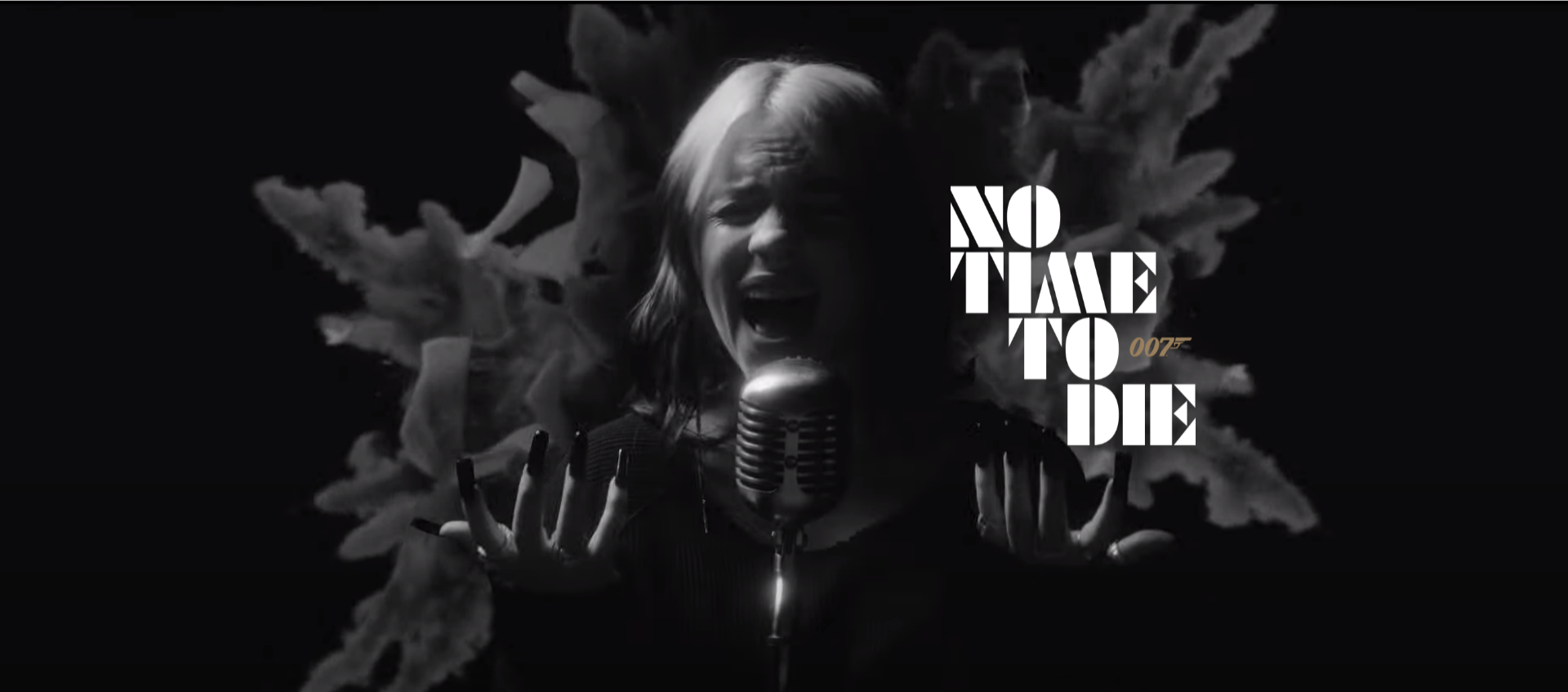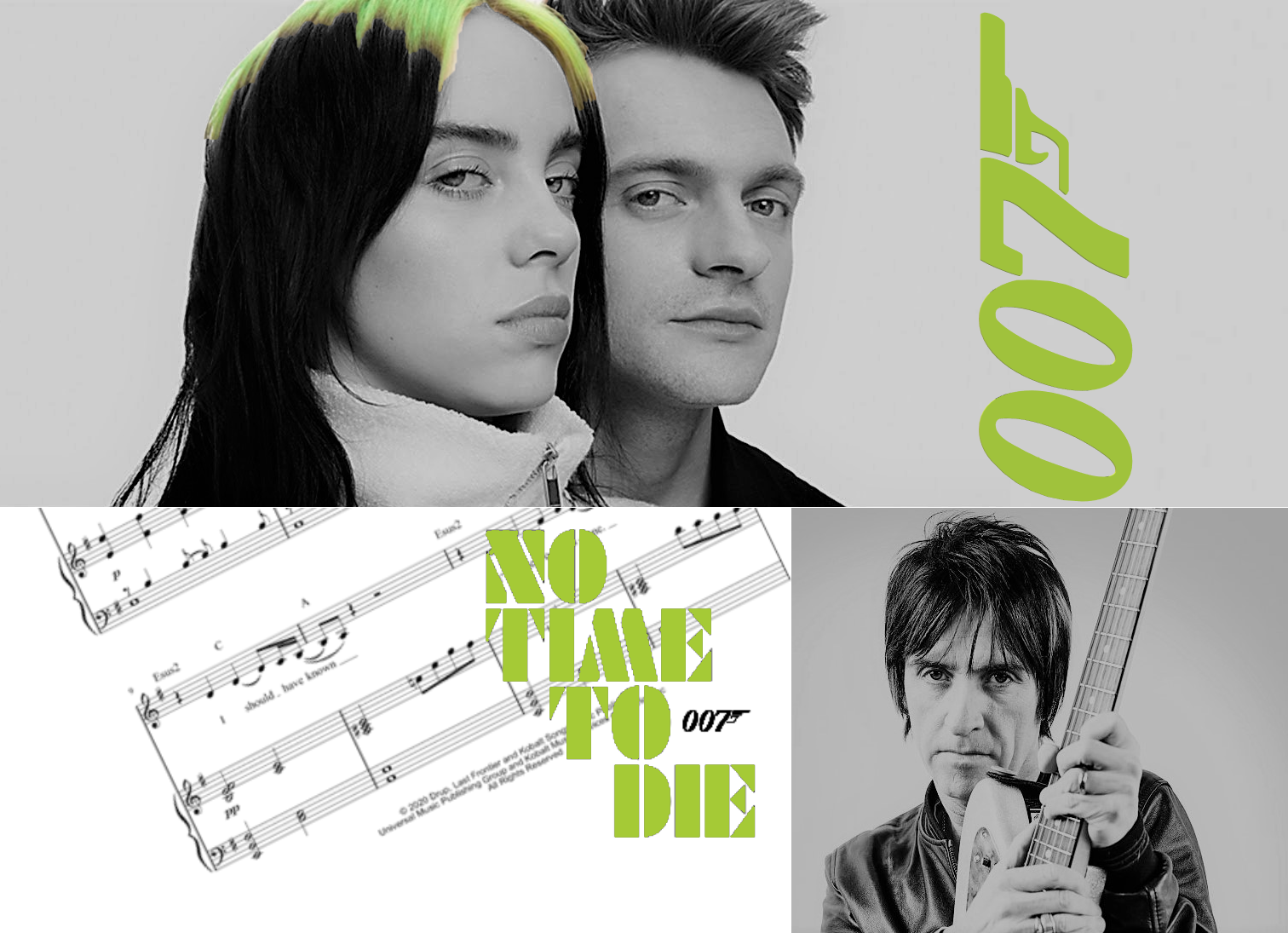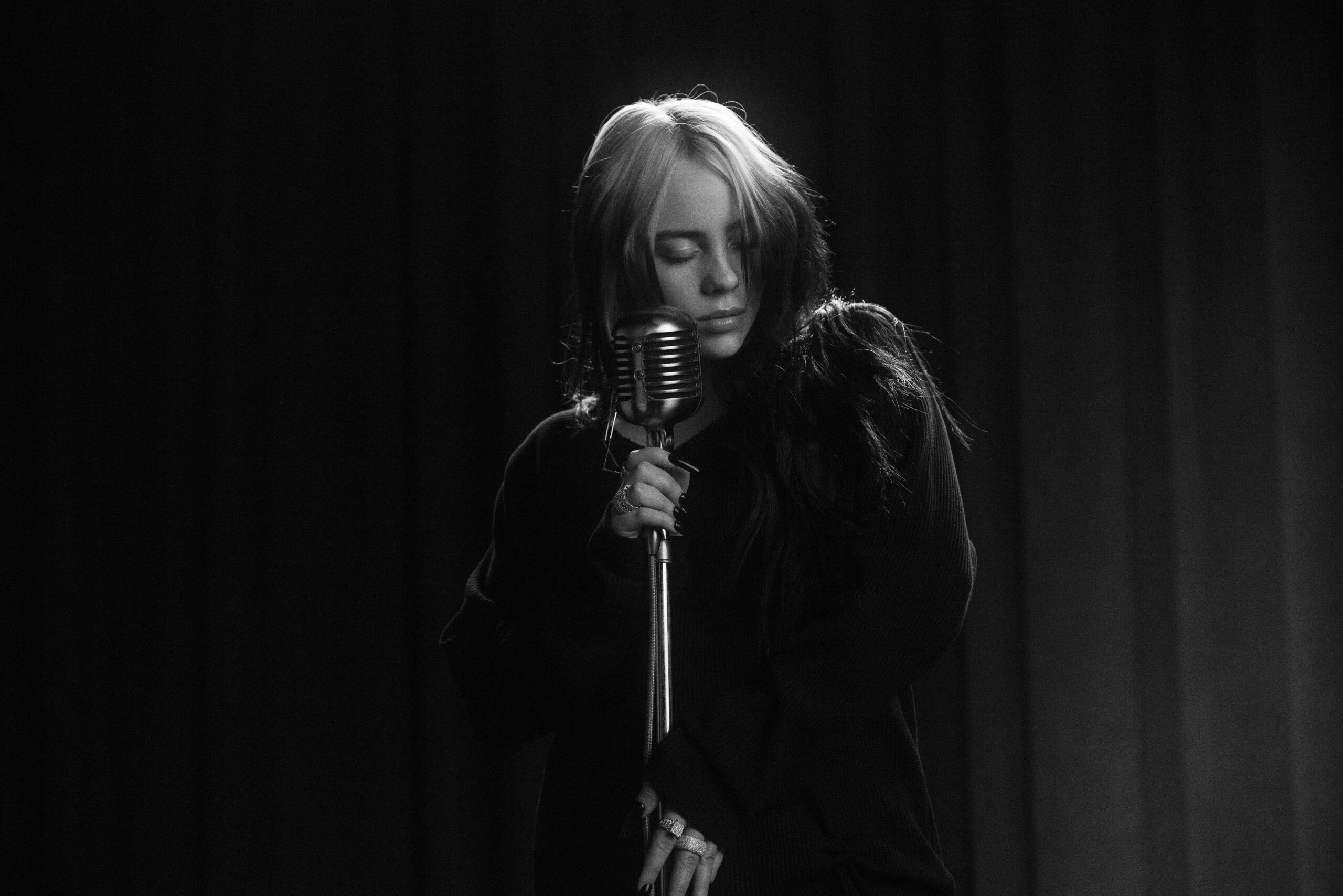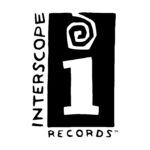

Fool me once, fool me twice.
Are you death or paradise?
We should have known. She’d leave the others alone. It just goes to show that when it comes to picking the right musical billboard to position along the streaming highways and download freeways, 007 has a contemporary knack of selling his new film to the younger hitchhikers via a pop powerhouse and a bit of creative happenstance. It always made total 2020 sense to cast American singer and songwriter Billie Eilish to perform Bond’s first movie anthem of his seventh cinematic decade. Eilish is zeitgeist. Eilish is young. Eilish is good. Eilish is also one of the brightest and sharpest minded artists currently out there. Glastonbury, Coachella, The Grammys, Chanel, Apple, the American Music Awards, South by Southwest, MTV and Time magazine have all positioned Billie centre-stage in the last year or so and not regretted it. Now it is the turn of James Bond 007.
Was I stupid to love?
Was I reckless to help?
Was it obvious to everybody else?
A sultry midnight ballad deliberately crafted through the prism of the other Bond overtures of the Daniel Craig era, Eilish’s titular lament ‘No Time to Die’ is a slow burning E-Minor siren of a 007 song. Positioning itself in an American movie sunset of rustbelt horizons not a million hitchhiking miles from composer and collaborator Hans Zimmer’s 1991 score for Thelma and Louise, Bond’s twenty-fifth overture flips the previous British sounds of Adele and Sam Smith to weave a new Americana into that often specific Bond sound. With Eilish’s forefront and crystal clear vocals acting as both percussion and instrument, ‘No Time to Die’ is not the work of an eighteen year old chanteuse or pop princess. In another world and on the back of Billie’s mature tones, ‘No Time to Die’ could have been Nina Simone’s greatest Bond song as Eilish’s smoky, beatnik vocals bring a soul beyond her years. To be fair, this Bond singer has barely had time to live, let alone die. As the headlines rightly trumpeted the youngest Bond artist in the seven decade history of Bond’s jukebox, there could well have been a concern about how Eilish could get that sense of time, melancholy, veterans looking back and trapped bird motif that underpins that Bond sound. Yet, as her ferocious rise to warranted stardom testifies, Eilish was never going to be an ingenue mistake for Bond. With her pitch pulsing and undulating alongside Johnny Marr’s dirty guitar twangs, Eilish frames and nails the Craig era’s sense of Bond and his isolated introspection. She brings a haunting sense of theatre and a totally contemporary timbre to the Bond jukebox that may well complete the hat trick of Academy Award Best Song wins for 007 come April 2022.
Just goes to show
That the blood you bleed is just the blood you owe.
As that aural smoke rises and billows, Eilish’s vocals act as kindling to a song that concludes the Craig era on screen. With the eighteen-year-old Billie and her collaborator brother Finneas and pal Kaan Gunesberk barely as old as this century, it becomes clear just how this Bond singer and song has grown up with Daniel Craig. ‘No Time to Die’ may echo strains of Sam Smith’s ‘Writing’s on the Wall’ and Adele’s ‘Skyfall’, but maybe it is meant to. Tasked with musically punctuating just how the sixth Bond’s tenure will end, Eilish and Finneas have clearly studied their brief well – bringing in the scratchy guitars of Chris Cornell’s ‘You Know My Name’ (Casino Royale, 2006), Smith’s high vocal leaps into whispered silence (Spectre, 2015), the Bond heritage of Adele’s strings (Skyfall, 2012) and even the relentless lyrical build of Alicia Keys and Jack White’s ‘Another Way to Die’ (Quantum of Solace, 2008).
However, what marks out ‘No Time to Die’ from its musical siblings is O’Connell’s lyrics. Whilst arguably David Arnold and Chris Cornell’s ‘You Know My Name’ and Adele and Paul Epworth’s Academy Award winning ‘Skyfall’ are more rounded productions with possibly a greater sense of build and three act beats, ‘No Time to Die’ has already made its mark with the strongest, most striking lyrics of any Bond song from the last four decades. ‘Fool me once, fool me twice – are you death or paradise?’ is a chilling, writerly flourish and can already sit proud with Lionel Bart’s ‘my tongue tied, young pride‘ (From Russia with Love, 1963), Leslie Bricusse and Anthony Newley’s ‘golden words he will pour in your ear, but his lies can’t disguise what you fear‘ (Goldfinger, 1964), Carole Bayer Sager’s ‘the way that you hold me whenever you hold me‘ (The Spy Who Loved Me, 1977) and Don Black’s ‘hold one up and caress it, touch it, stroke it and undress it‘ (Diamonds are Forever, 1971).

For a Bond bullet that has made great strides to bring in women to bolster the creative choices of No Time to Die, it makes natural sense that Billie Eilish should bring her best game to her penmanship with a song that Bond producers Barbara Broccoli and Michael G. Wilson have suggested is “impeccably crafted to work within the emotional story of the film.” It is a sentiment echoed by the film’s American director Cary Joji Fukunaga who suggests “Billie Eilish has been my number one choice to do this theme song since I came on board this project. 18 months later, I can hardly contain my excitement for this moment. She and Finneas have delivered a spectacular and haunting song that gives me chills every time I listen to it.” Those chills soon extended to the 2020 Brit Awards in February 2020 where Eilish brought that haunting quality and floored the UK’s premiere music industry night with a live performance flanked by her brother Finneas, guitarist Johnny Marr and composer Hans Zimmer.
Eilish doesn’t mention guns and Martinis. Eilish flips the Bond song trope to frame Bond as the trapped bird looking back, rather than the familiar female voice kicking herself for falling in love with a spy. And Eilish doesn’t just rhyme. As her 2019 summer anthem ‘Bad Guy’ proved, she instead alliterates (‘the blood you bleed is just the blood you owe‘), she uses syllables to bridge the pace and change of key – and she has a skill of separating her breathy tones from Zimmer’s ever dominant Bond strings. Whilst the song reaches for those more familiar Bond tropes when it possibly doesn’t need to – and there is always a difference between formulaic and classic – Eilish navigates Zimmer’s orchestra with ease, keeping her vocals and their melancholic story centre-stage throughout. Ultimately, the track’s greatest strength is how it totally remains a Billie Eilish number cut from the same baggy clothed cloth of ‘When I Was Older’, ‘Ocean Eyes’ and ‘Everything I Wanted’. Every Bond song should first and foremost remain a product of their performer or performers. ‘No Time to Die’ holds that Eilish sense of a twilight drive through LA or – with the help here of Zimmer’s end credit sunsets – a railroad lament loaded with window-gazing reflection, passing telegraph wires and John Ford canyons. It is possibly a stronger departure from the Bond song formula than at first appears.
Now you’ll never see me cry.
There’s just no time to die.
In October 2020, Billie Eilish, Finneas, Hans Zimmer and Interscope Records / The Darkroom released the official video for ‘No Time to Die’. Directed by 007 title designer Daniel Kleinman (who first got the attention of the Bond bosses when he shot the 1989 video for Gladys Knight’s ‘Licence to Kill’), the promo short is one of a simple mic motif that remembers the artist before the franchise with a Bond flourish or two. And in December 2020 a first for a Bond song became real. As expected, Eilish was nominated for a Grammy Award for ‘No Time to Die’. A category she could easily have success in may well see Bond 25 receive a golden gong before its actual release.
No Time to Die plans to release globally from October 2021.
Billie Eilish’s ‘No Time to Die’ is released via Interscope Records / The Darkroom / Universal Music Group.
Mark O’Connell joins BBC News and Sky News to discuss Billie Eilish, ‘No Time to Die’ and the expectations as Bond gets a brand new track to add to his jukebox of movie immortality…




